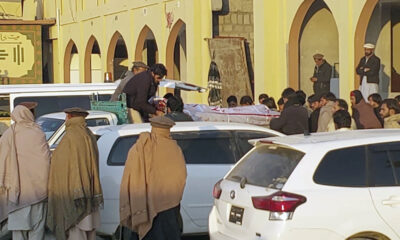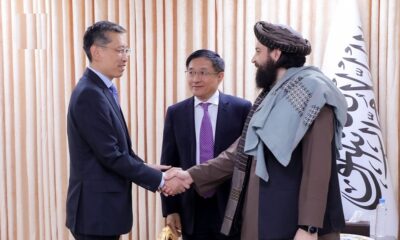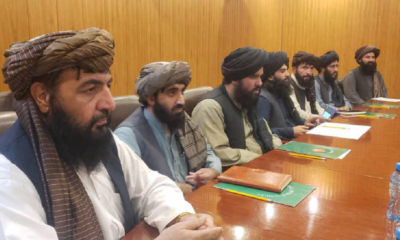World
Why Palestinians can count on American students but not Arab allies to protest
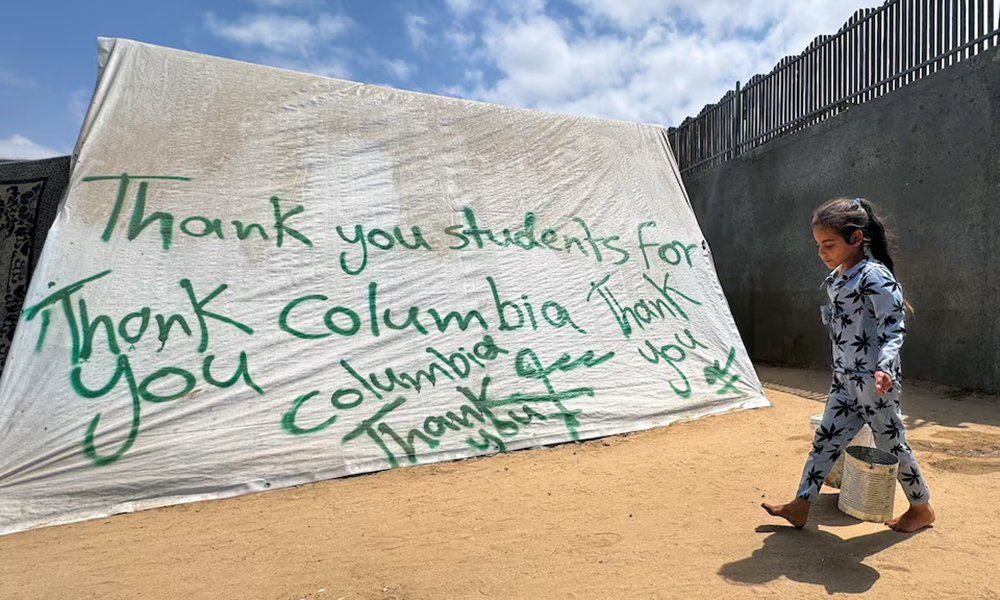
Palestinians may be gratified to see American university campuses erupt in outrage over Israel's offensive in Gaza, but some in the embattled enclave are also wondering why no similar protests have hit the Arab countries they long viewed as allies, Reuters reported.
Demonstrations have rocked U.S. universities this week, with confrontations between students, counter protesters and police, but while there have been some protests in Arab states, they have not been nearly as large or as vociferous.
"We follow the protests on social media every day with admiration but also with sadness. We are sad that those protests are not happening also in Arab and Muslim countries," said Ahmed Rezik, 44, a father of five sheltering in Rafah in Gaza's south.
"Thank you students in solidarity with Gaza. Your message has reached us. Thank you students of Columbia. Thank you students," was scrawled across a tent in Rafah, where more than a million people are sheltering from Israel's offensive.
Reasons for the comparative quiet on Arab campuses and streets may range from a fear of angering autocratic governments to political differences with Hamas and its Iranian backers or doubts that any protests could impact state policy, read the report.
American students at elite universities may face arrest or expulsion from their schools, but harsher consequences could await Arab citizens protesting without state authorisation.
And U.S. students may feel more motivation to protest as their own government backs and arms Israel, while even those Arab countries that have full diplomatic relations with it have been strongly critical of its military campaign.
When asked about the conflict, Arabs from Morocco to Iraq have consistently voiced fury at Israel's actions and solidarity with Gaza's embattled inhabitants, leading to muted Ramadan celebrations across the region last month.
Some rallies to support Palestinians have erupted, notably in Yemen where the Houthis have joined the conflict with strikes on shipping in the Red Sea.
And Arabs around the region have also shown their horror at the war and support for their fellow Arabs in Gaza on social media, even if they have not taken to the streets.
But whatever the reason for the lack of public protests, some people in Gaza are now drawing unfavourable comparisons between the tumult in the United States and the public reaction they can see in other Arab countries.
"I ask Arab students to do what the Americans have done. They should have done more for us than the Americans," said Suha al-Kafarna, displaced by the war from home in northern Gaza.
In Egypt, which made peace with Israel in 1979 and where President Abdel Fattah al-Sisi has largely outlawed public protests, the authorities fear that demonstrations against Israel could later turn against the government in Cairo.
At state-sanctioned protests over the war in October, some demonstrators veered off the agreed route and chanted anti-government slogans, prompting arrests.
"One cannot see the lack of large public protests against the war and the muted reaction on the Egyptian street in isolation from a broader context of crackdown on all forms of public protest and assembly," said Hossam Bahgat, head of the Egyptian Initiative for Personal Rights.
At the American University in Cairo security forces are less likely to intervene on campus and there have been some protests. But a student activist there who requested anonymity said they could still face consequences for demonstrating.
"Being arrested here is nothing like being arrested in the U.S. It's completely different," he said, adding that there was "the factor of fear" preventing many from taking to the streets.
In Lebanon, where success in studies has become even more personally important to many young people after years of political and economic crises that have shrunk their shot at future prosperity, that calculation is even tougher.
Several students Reuters approached at campus protests in Beirut declined to be interviewed, saying they feared repercussions from university authorities.
The complex histories of Lebanon and other Arab states such as Jordan that host many Palestinian refugees also play into the question of public protests.
In Lebanon, some people blame Palestinians for triggering the 1975-90 civil war. Others fear any overt displays of support for Palestinians might be hijacked by the Iran-backed Hezbollah, which has been trading fire with Israel since the start of the Gaza conflict, Reuters reported.
"The Arab world is not reacting like Columbia or Brown (U.S. universities) because they don't have the luxury to do so," said Makram Rabah, a history professor at the American University of Beirut.
Besides, he added, with public opinion already largely backing the Palestinian cause it was not clear what protests there would achieve.
"The dynamics of power and the way you change public perception are just different in the Arab world compared to the U.S.," he said.
For Tamara Rasamny, a Lebanese-American arrested and suspended for participating in a sit-in at Columbia a month before getting her degree, that reality has come home hard.
She was meant to deliver a speech at her graduation, and thought about whether it would have been more powerful to send a message there or through her possible arrest.
"And then I thought, my speech is literally about being brave, courageous and speaking up – so I thought if I'm not even listening to my own words, who am I to say anything? That was my logic, and it was worth it," she told Reuters from New York.
Rasamny said she knew it might not have been possible to express herself this way had she been at home in Lebanon.
"I feel in Lebanon it would be more frustrating to watch what's unfolding because there hasn't really been an outlet to do much about it - like take to the streets," she said.
World
Gunman shot dead, 3 police injured in shooting near Israeli embassy in Jordan
Police had called on residents to stay in their homes as security personnel searched for the culprits, a security source said.
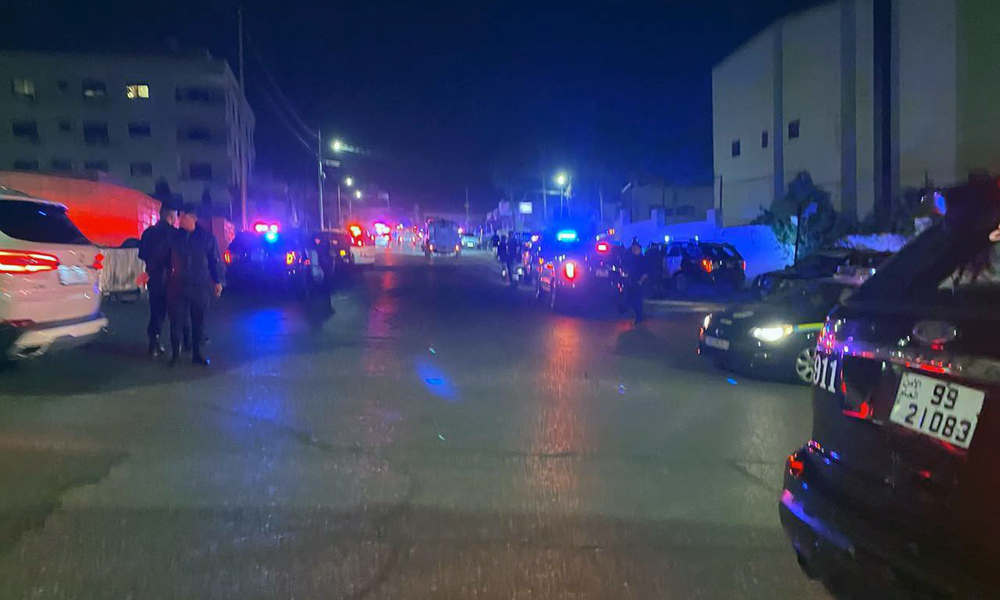
A gunman was dead and three policemen injured after a shooting near the Israeli embassy in neighbouring Jordan, a security source and state media said on Sunday.
Police shot a gunman who had fired at a police patrol in the Rabiah neighbourhood of Amman, state news agency Petra reported, citing public security, adding investigations were ongoing, Reuters reported.
Jordanian police had earlier cordoned off an area near the heavily policed embassy after gunshots were heard, witnesses said. Two witnesses said police and ambulances rushed to the Rabiah neighbourhood, where the embassy is located.
The area is a flashpoint for frequent demonstrations against Israel. The kingdom has witnessed some of the biggest peaceful rallies across the region as anti-Israel sentiment runs high over the war in Gaza.
Police had called on residents to stay in their homes as security personnel searched for the culprits, a security source said.
Many of Jordan’s 12 million citizens are of Palestinian origin, they or their parents having been expelled or fled to Jordan in the fighting that accompanied the creation of Israel in 1948. Many have family ties on the Israeli side of the Jordan River, read the report.
Jordan's peace treaty with Israel is unpopular among many citizens who see normalisation of relations as betraying the rights of their Palestinian compatriots.
World
Powerful Israeli airstrike shakes central Beirut, 11 dead

A powerful airstrike killed 11 people in central Beirut on Saturday, the Lebanese civil defence said, shaking the capital as Israel pressed its offensive against the Iran-backed Hezbollah group.
The attack destroyed an eight-storey building and caused a large number of fatalities and injuries, Lebanon's National News Agency said. Footage broadcast by Lebanon's Al Jadeed station showed at least one destroyed building and several others badly damaged around it, Reuters reported.
Israel used bunker buster bombs in the strike, leaving a deep crater, the agency said. Beirut smelled strongly of explosives hours after the attack.
The blasts shook the capital at around 4 a.m. (0200 GMT). Security sources said at least four bombs were dropped in the attack.
It marked the fourth Israeli airstrike this week targeting a central area of Beirut, in contrast to the bulk of Israel's attacks on the capital region, which have hit the Hezbollah-controlled southern suburbs. On Sunday an Israeli airstrike killed a Hezbollah media official in the Ras al-Nabaa district of central Beirut.
Rescuers searched through rubble, in an area of the city known for its antique shops.
HOSPITALISED DAUGHTER
A man whose family was hurt tried to comfort a traumatized woman outside a hospital. Car windows were shattered.
"There was dust and wrecked houses, people running and screaming, they were running, my wife is in hospital, my daughter is in hospital, my aunt is in the hospital," said the man, Nemir Zakariya, who held up a picture of his daughter.
"This is the little one, and my son also got hurt - this is my daughter, she is in the American University (of Beirut Medical Centre), this is what happened."
Israel launched a major offensive against Hezbollah in Lebanon in September, following nearly a year of cross-border hostilities ignited by the Gaza war, pounding wide areas of Lebanon with airstrikes and sending troops into the south.
Israeli strikes killed at least 62 people and injured 111 in Lebanon on Thursday, bringing the toll since October 2023 to 3,645 dead and 15,355 injured, Lebanon's health ministry said. The figures do not distinguish between combatants and civilians.
Hezbollah and the Lebanese government accuse Israel of indiscriminate bombing that kills civilians. Israel denies the allegation and says it takes numerous steps to avoid the deaths of civilians.
Hezbollah strikes in the same period have killed more than 100 people in northern Israel and the Israeli-occupied Golan Heights. They include more than 70 soldiers killed in strikes in northern Israel and the Golan Heights and in combat in southern Lebanon, according to Israel.
The conflict began when Hezbollah, Tehran's most important ally in the region, opened fire in solidarity with its Palestinian ally Hamas after it launched the Oct. 7, 2023 attack on southern Israel.
A U.S. mediator travelled to Lebanon and Israel this week in an effort to secure a ceasefire. The envoy, Amos Hochstein, indicated progress had been made after meetings in Beirut, before going to meet Israeli Prime Minister Benjamin Netanyahu and Defence Minister Israel Katz.
World
North Korea’s Kim accuses US of stoking tension, warns of nuclear war

North Korean leader Kim Jong Un has accused the United States of ramping up tension and provocations, saying the Korean peninsula has never faced a greater risk of nuclear war, state media KCNA said on Friday.
The comments came amid international criticism over increasingly close military co-operation between Pyongyang and Moscow, and assertions that North Korea sent more than 10,000 troops to Russia to support its invasion of Ukraine, Reuters reported.
Previous negotiations with Washington have only highlighted its "aggressive and hostile" policy toward North Korea, Kim said in a speech at a military exhibition in Pyongyang, the capital, the KCNA news agency said.
"Never before have the warring parties on the Korean peninsula faced such a dangerous and acute confrontation that it could escalate into the most destructive thermonuclear war," he said on Thursday.
"We have already gone as far as we can on negotiating with the United States," he said, adding that the talks had only shown its aggressive and hostile policy toward North Korea could never change.
North Korean state media have not yet publicly mentioned the re-election of Donald Trump, who held three unprecedented meetings with Kim during his first term, in Singapore, Hanoi, and at the Korean border, in 2018 and 2019.
But their diplomacy yielded no concrete outcome due to the gap between U.S. calls for North Korea to abandon its nuclear weapons and Kim's demands for sanctions relief.
Trump has long touted his ties with Kim, saying last month the two countries would have had "a nuclear war with millions of people killed", but he had stopped it, thanks to his ties with the North's leader.
Hong Min, a research fellow at the Korea Institute for National Unification in Seoul, said Kim could be trying to underscore the North's nuclear capabilities ahead of Trump's second term, while leaving the door open for diplomacy.
"He might be suggesting Trump should show his 'willingness to co-exist' before re-opening any talks and calling for a change in the U.S. hostile attitude," Hong said.
MILITARY EXHIBITION
Kim also called for developing and upgrading "ultra-modern" versions of weaponry, and vowed to keep advancing defence capabilities to bolster the North's strategic position, KCNA said.
Strategic and tactical weapons were on display at the event, called the Defence Development Exhibition.
KCNA pictures showed the Hwasong-19 and 18 intercontinental ballistic missiles, the Chollima-1 rocket used in a successful satellite launch in November 2023, and the Saetbyol-9 multi-purpose attack drone, which resembles the U.S. Reaper.
Hong said the pictures also included several weapons needed by or presumed to already have been supplied to Russia for its war in Ukraine, such as 240mm multiple rocket launchers, self-propelled howitzers, anti-tank systems and drones.
North Korea has shipped additional arms to Russia, the South's lawmakers said on Thursday, after being briefed by the national intelligence agency.
Last year, when he was defence minister, Russian Security Council Secretary Sergei Shoigu accompanied Kim to a defence fair that showcased missiles and weapons.
Last week, Kim urged the North's military to improve its war-fighting capabilities, blaming the United States and its allies for stoking tension to "the worst phase in history" and calling the Korean peninsula "the world's biggest hotspot".
-
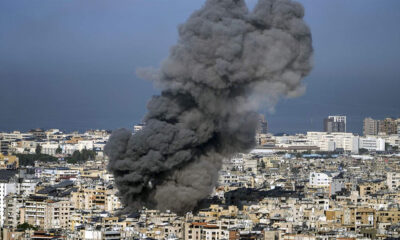
 World5 days ago
World5 days agoLebanon, Hezbollah agree to US proposal for ceasefire with Israel, Lebanese official says
-

 Latest News5 days ago
Latest News5 days agoTajikistan trumps Afghanistan 3-1 in football friendly
-

 Latest News4 days ago
Latest News4 days agoEU marks International Children’s Day, says it supports Afghan children
-
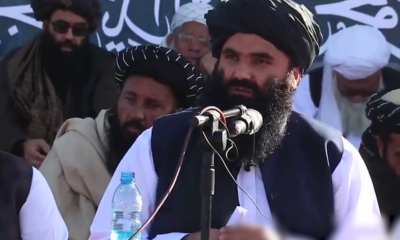
 Latest News5 days ago
Latest News5 days agoAfghanistan wants relations with countries not opposed to Sharia law: Haqqani
-

 Sport3 days ago
Sport3 days agoAriana News to broadcast IPL auction live and exclusively in Afghanistan
-
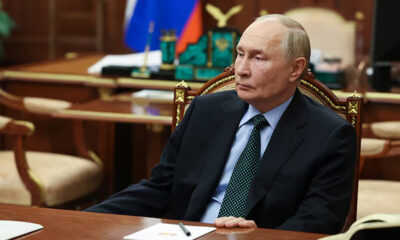
 World5 days ago
World5 days agoPutin issues warning to US with new nuclear doctrine
-

 Latest News2 days ago
Latest News2 days agoU.S. House approves bill on evacuation of Afghan allies
-
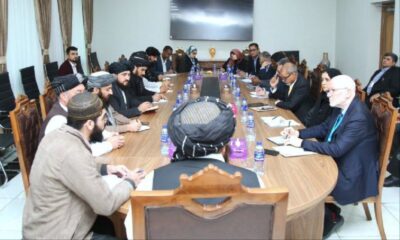
 Health5 days ago
Health5 days agoMuttaqi appeals to WHO to help strengthen Afghanistan’s health sector


